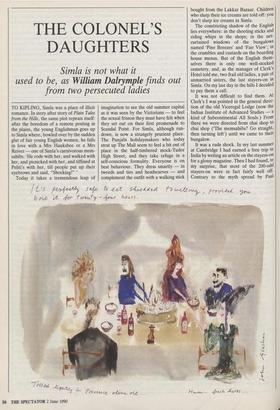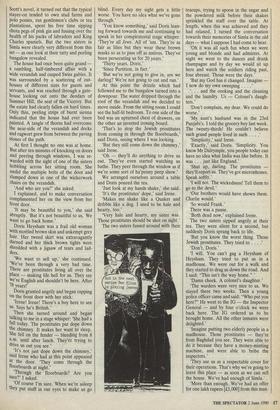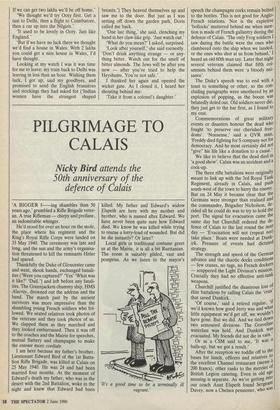THE COLONEL'S DAUGHTERS
Simla is not what it from two persecuted ladies
TO KIPLING, Simla was a place of illicit romance. In story after story of Plain Tales from the Hills, the same plot repeats itself: after the boredom of a remote posting in the plains, the young Englishman goes up to Simla where, bowled over by the sudden glut of fair young English women, he falls in love with a Mrs Hauksbee or a Mrs Reiver — one of Simla's carnivorous mem- sahibs: 'He rode with her, and walked with her, and picnicked with her, and tiffined at Peliti's with her, till people put up their eyebrows and said, "Shocking!" '
Today it takes a tremendous leap of imagination to see the old summer capital as it was seen by the Victorians — to feel the sexual frisson they must have felt when they set out on their first promenade to Scandal Point. For Simla, although run- down, is now a strangely prurient place. The Punjabi holidaymakers who today strut up The Mall seem to feel a bit out of place in the half-timbered mock-Tudor High Street, and they take refuge in a self-conscious formality. Everyone is on best behaviour. They dress smartly — in tweeds and ties and headscarves — and complement the outfit with a walking stick bought from the Lakkar Bazaar. Children who slurp their ice creams are told off: you don't slurp ice creams in Simla.
The constricting shadow of the English lies everywhere: in the shooting sticks and riding whips in the shops; in the net- curtained windows of the bungalows named 'Pine Breezes' and 'Fair View'; in the crumbles and custards on the boarding house menus. But of the English them- selves there is only one well-stocked cemetery, and, as the manager of Clerk's Hotel told me, two frail old ladies, a pair of unmarried sisters, the last stayers-on in Simla. On my last day in the hills I decided to pay them a call. It was not difficult to find them. At Clerk's I was pointed in the general direc- tion of the old Viceregal Lodge (now the Indian Institute of Advanced Studies — a kind of Subcontinental All Souls.) From there we were directed from chai shop to chai shop (`The memsahibs? Go straight, then turning left') until we came to their bungalow.
It was a rude shock. In my last summer at Cambridge I had earned a free trip to India by writing an article on the stayers-on for a glossy magazine. Then I had found, to my surprise, that most of the 200-odd stayers-on were in fact fairly well off. Contrary to the myth spread by Paul Scott's novel, it turned out that the typical stayer-on tended to own stud farms and polo ponies, ran gentlemen's clubs or tea plantations, spent his free time sipping chota pegs of pink gin and fussing over the health of his packs of labradors and King Charles spaniels. But the two sisters in Simla were clearly very different from this set — as one look at their tatty and peeling bungalow revealed.
The house had once been quite grand a rambling, half-timbered affair with a wide verandah and cusped Swiss gables. It was surrounded by a scattering of out- houses of different sizes for guests and servants, and was reached through a gate- house looking out onto the deodars of Summer Hill, the seat of the Viceroy. But the estate had clearly fallen on hard times.
Only thin, peeling strips of burnt sienna indicated that the house had ever been painted. A tangle of thorns had overcome the near-side of the verandah and docks and ragwort grew from between the paving stones of the path.
At first I thought no one was at home. But after ten minutes of knocking on doors and peering through windows, I was re- warded with the sight of one of the sisters hobbling across her sitting room. She undid the multiple bolts of the door and slumped down in one of the wickerwork chairs on the verandah.
`And who are you?' she asked.
I explained, and to make conversation complimented her on the view from her front door.
'It may be beautiful to you,' she said abruptly. 'But it's not beautiful to us. We want to go back home.'
Doris Heysham was a frail old woman with mottled brown skin and unkempt grey hair. Her tweed skirt was extravagantly darned and her thick brown tights were shredded with a jigsaw of tears and lad- ders.
`We want to sell up,' she continued. We've been through a very bad time. There are prostitutes living all over the place — making life hell for us. They say we're English and shouldn't be here. After 78 years!'
Doris grunted angrily and began rapping on the front door with her stick: `Irene! Irene! There's a boy here to see us. Says he's British.'
Then she turned around and began talking to me in a stage whisper: 'She had a fall today. The prostitutes put dope down the chimney. It makes her want to sleep. She fell on the fender — bleeding from 8 a.m. until after lunch. They're trying to drive us out you see.' `It's not just dope down the chimney,' said Irene who had at this point appeared at the door. 'They come through the floorboards at night.' 'Through the floorboards? Are you sure?' I asked.
`Of course I'm sure. When we're asleep they put stuff in our eyes to make us go blind. Every day my sight gets a little worse. You have no idea what we've gone through.'
`You know something,' said Doris lean- ing forward towards me and continuing to speak in her conspiratorial stage whisper. 'They're all Jews. All of 'em. They're as fair as lilies but they wear these brown masks so as to pass off as natives. They've been persecuting us for 20 years.'
`Thirty years, Doris.'
`Since Partition, in fact.'
`But we're not going to give in, are we darling? We're not going to cut and run.'
At this point the drizzle which had followed me to the bungalow turned into a downpour. The water dripped through the roof of the verandah and we decided to move inside. From the sitting room I could see the half-lit bedroom. To one side of the bed was an upturned chest of drawers, on the other an inverted ironing board.
`That's to stop the Jewish prostitutes from coming in through the floorboards,' said Doris, seeing where I was looking.
`But they still come down the chimney,' said Irene.
`Oh — they'll do anything to drive us out. They've even started watching us bathe. They peer through the window as if we're some sort of ha'penny peep show.'
We arranged ourselves around a table and Doris poured the tea.
`Just look at my hands shake,' she said. `It's the prostitutes' dope,' said Irene. `Makes me shake like a Quaker and dribble like a dog. I used to be hale and hearty, too.'
`Very hale and hearty, my sister was. Those prostitutes should be shot on sight.' The two sisters fussed around with their teacups, trying to spoon in the sugar and the powdered milk before their shakes sprinkled the stuff over the table. At length, when this was achieved and they had relaxed, I turned the conversation towards their memories of Simla in the old days — what I suppose I had come to hear.
`Oh it was all such fun when we were young and blonde and had admirers. At night we went to the dances and drank champagne and by day we would sit up here and watch the soldiers riding past, four abreast. Those were the days.'
`But my God has it changed. Imagine I now do my own sweeping . . .
. . and the cooking and the cleaning and the laundry. Us — Colonel's daugh- ters.'
`Don't complain, my dear. We could do worse.'
`My aunt's husband was in the 23rd Punjabi's. I told the grocery boy last week. The twenty-thirds! He couldn't believe such grand people lived in such . . .
`Simplicity,' said Irene.
`Exactly,' said Doris. 'Simplicity. You know Mr Dalrymple, you people today can have no idea what India was like before. It was . . . just like England.'
`Shut up, darling. The prostitutes they'll report us. They've got microphones. Speak softly.'
`I will not. The wickedness! Tell them to go to the devil.'
`Our brothers would have shown them. Charlie would.'
`So would Frank.'
There was a pause.
`Both dead now,' explained Irene.
The two sisters sipped angrily at their tea. They were silent for a second, but suddenly Doris sprang back to life.
`But you know the worst thing. Those Jewish prostitutes. They tried to . . . `Don't, Doris.'
`I will. You can't gag a Heysham of Heysham. They tried to put us in a madhouse. We were out for a walk and they started to drag us down the road. And I said: "This isn't the way home." ' `Damn cheek. A colonel's daughter.'
`The warders were very nice to us. We stayed there two weeks. Then a young police officer came and said: "Who put you here?" He went to the IG — the Inspector General — and by four o'clock we were back here. The IG ordered us to be brought home. All the other inmates were delighted.'
'Imagine putting two elderly people in a madhouse. Those prostitutes — they're from Baghdad you see. They were able to do it because they have a money-minting machine, and were able to bribe the inspectors.'
`They use us as a respectable cover for their operations. That's why we're going to leave this place — as soon as we can sell the house. We've had enough of Simla.'
`More than enough. We've had an offer for one lakh rupees [£3,000] from this man. If we can get two lakhs we'll be off home.' `We thought we'd try Ooty first. Get a taxi to Delhi, then a flight to Coimbatore, then a car up into the Nilgiris.'
`It used to be lovely in Ooty. Just like England.'
`But if we have no luck there we thought we'd find a house in Wales. With 2 lakhs you could get a nice house in Wales, I'd have thought.
Looking at my watch I was it was time for me to leave: my train back to Delhi was leaving in less than an hour. Wishing them luck, I got up, said my goodbyes, and promised to send the English brassieres and stockings they had asked for (Indian women have the strangest shaped breasts.') They heaved themselves up and saw me to the door. But just as I was setting off down the garden path, Doris called me back.
`One last thing,' she said, clenching my hand in her claw-like grip. 'Just watch out.'
`What do you mean?' I asked, surprised.
`Look after yourself,' she said earnestly. `Don't drink anything strange — or any- thing bitter. Watch out for the smell of bitter almonds. The Jews will be after you now — after you've tried to help the Heyshams. You're not safe.'
I thanked her again and opened the wicket gate. As I closed it, I heard her shouting behind me: `Take it from a colonel's daughter.'




















































 Previous page
Previous page